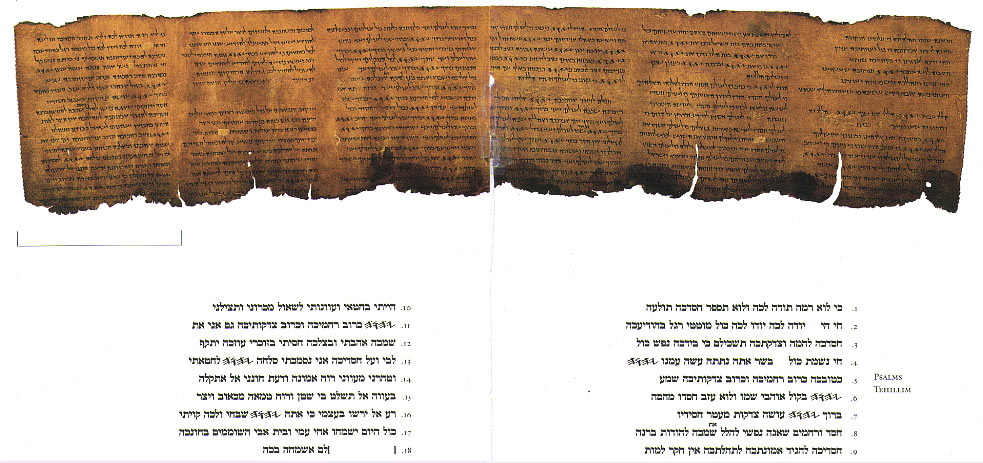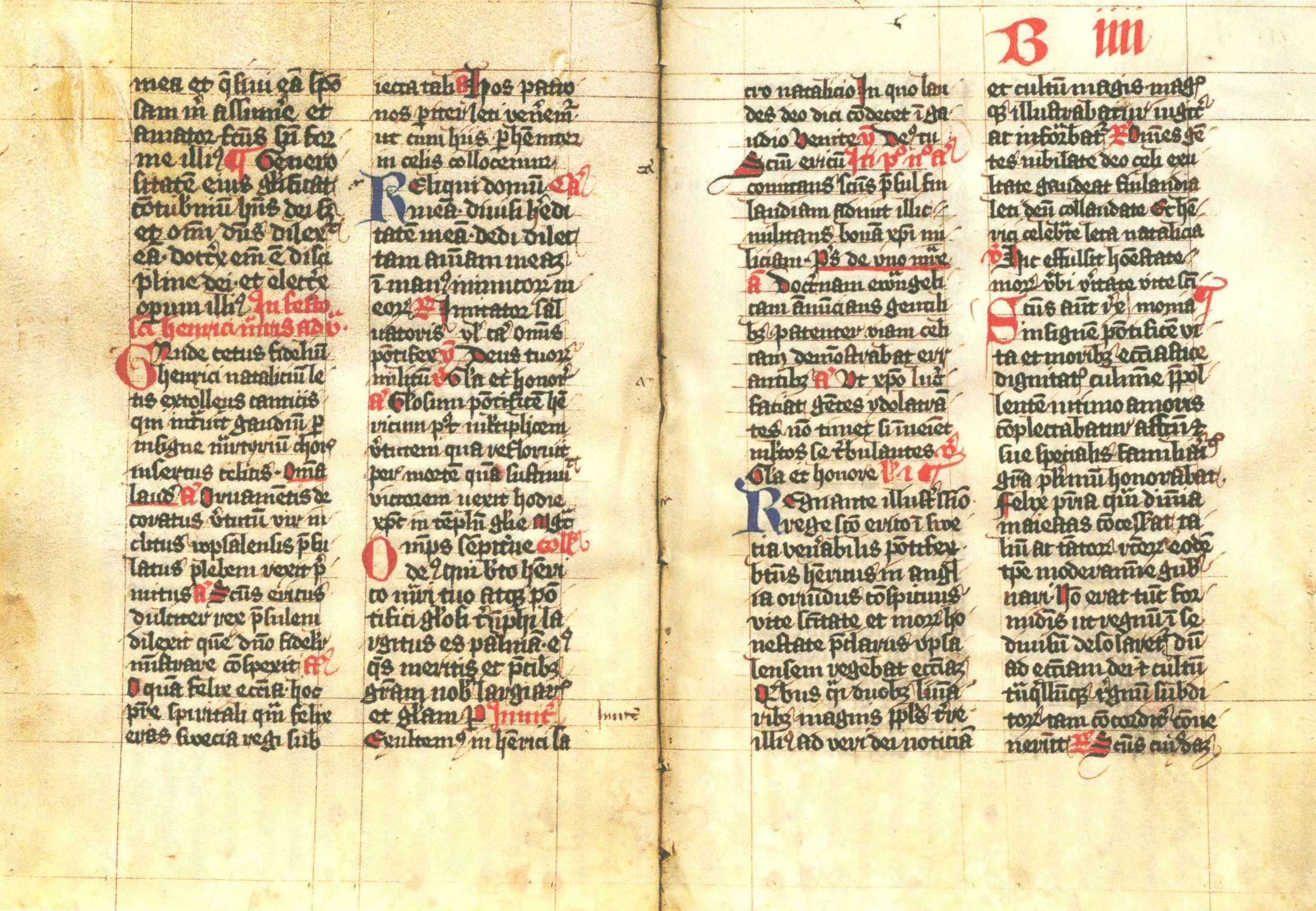|
Psalm 151
Psalm 151 is a short psalm found in most copies of the Septuagint (LXX), but not in the Masoretic Text of the Hebrew Bible. The title given to this psalm in the Septuagint indicates that it is supernumerary, as no number is affixed to it. The psalm is ascribed to David. It is also included in some manuscripts of the Peshitta. The psalm concerns the story of David and Goliath. The Eastern Orthodox, Coptic Orthodox, Armenian Apostolic, and Syrian Orthodox churches accept Psalm 151 as canonical. Catholics, Protestants, and most Jews consider it apocryphal. However, it is found in some Catholic Bibles, such as certain editions of the Latin Vulgate, as well as in some ecumenical translations, such as the Revised Standard Version. Psalm 151 is cited once in the Extraordinary Form of the Roman Breviary, as a responsory of the series from the books of Kings, the second in the Roman Breviary, together with (Greek 1–2 Kings = trad. 1–2 Samuel; Greek 3–4 Kings = trad. 1–2 Kings) in ... [...More Info...] [...Related Items...] OR: [Wikipedia] [Google] [Baidu] |
The Great Psalms Scroll
The Great Psalms Scroll, also referred to as 11Q5, is the most substantial and well preserved Dead Sea Scrolls Psalms manuscript of the thirty-seven discovered in the Qumran caves, six of which were discovered in Cave 11. Description The scroll was discovered in February of the year 1956, ten years after the initial discovery of the scrolls. It was purchased by The Palestine Archaeological Museum located in Jerusalem and first unrolled in November 1961. Four fragments of this scroll were later purchased by the same museum. The scroll's physical make up is that of dark yellow animal hide and is a little less than 1 mm thick. The primary body of the manuscript consists of “5 sheets of leather, still sewn together”, and is 4.253 meters in length. It is estimated to have been copied anywhere from 30-50 AD, and is written in Biblical style Hebrew. When rolled out, it forms a slight arc, and the top part is clean and well kept, while the bottom is decomposing significantly. It ... [...More Info...] [...Related Items...] OR: [Wikipedia] [Google] [Baidu] |
11Q5 (Psalm 151)
The Great Psalms Scroll, also referred to as 11Q5, is the most substantial and well preserved Dead Sea Scrolls Book of Psalms, Psalms manuscript of the thirty-seven discovered in the Qumran Caves, Qumran caves, six of which were discovered in List of manuscripts from Qumran Cave 11, Cave 11. Description The scroll was discovered in February of the year 1956, ten years after the initial discovery of the scrolls. It was purchased by The Palestine Archaeological Museum located in Jerusalem and first unrolled in November 1961. Four fragments of this scroll were later purchased by the same museum. The scroll's physical make up is that of dark yellow animal hide and is a little less than 1 mm thick. The primary body of the manuscript consists of “5 sheets of leather, still sewn together”, and is 4.253 meters in length. It is estimated to have been copied anywhere from 30-50 AD, and is written in Biblical style Hebrew. When rolled out, it forms a slight arc, and the top part is ... [...More Info...] [...Related Items...] OR: [Wikipedia] [Google] [Baidu] |
Psalms
The Book of Psalms ( or ; he, תְּהִלִּים, , lit. "praises"), also known as the Psalms, or the Psalter, is the first book of the ("Writings"), the third section of the Tanakh, and a book of the Old Testament. The title is derived from the Greek translation, (), meaning "instrumental music" and, by extension, "the words accompanying the music". The book is an anthology of individual Hebrew religious hymns, with 150 in the Jewish and Western Christian tradition and more in the Eastern Christian churches. Many are linked to the name of David, but modern mainstream scholarship rejects his authorship, instead attributing the composition of the psalms to various authors writing between the 9th and 5th centuries BC. In the Quran, the Arabic word ‘Zabur’ is used for the Psalms of David in the Hebrew Bible. Structure Benedictions The Book of Psalms is divided into five sections, each closing with a doxology (i.e., a benediction). These divisions were probably intro ... [...More Info...] [...Related Items...] OR: [Wikipedia] [Google] [Baidu] |
Latin
Latin (, or , ) is a classical language belonging to the Italic branch of the Indo-European languages. Latin was originally a dialect spoken in the lower Tiber area (then known as Latium) around present-day Rome, but through the power of the Roman Republic it became the dominant language in the Italian region and subsequently throughout the Roman Empire. Even after the fall of Western Rome, Latin remained the common language of international communication, science, scholarship and academia in Europe until well into the 18th century, when other regional vernaculars (including its own descendants, the Romance languages) supplanted it in common academic and political usage, and it eventually became a dead language in the modern linguistic definition. Latin is a highly inflected language, with three distinct genders (masculine, feminine, and neuter), six or seven noun cases (nominative, accusative, genitive, dative, ablative, and vocative), five declensions, four verb conjuga ... [...More Info...] [...Related Items...] OR: [Wikipedia] [Google] [Baidu] |
1st Century
The 1st century was the century spanning AD 1 ( I) through AD 100 ( C) according to the Julian calendar. It is often written as the or to distinguish it from the 1st century BC (or BCE) which preceded it. The 1st century is considered part of the Classical era, epoch, or historical period. The 1st century also saw the appearance of Christianity. During this period, Europe, North Africa and the Near East fell under increasing domination by the Roman Empire, which continued expanding, most notably conquering Britain under the emperor Claudius ( AD 43). The reforms introduced by Augustus during his long reign stabilized the empire after the turmoil of the previous century's civil wars. Later in the century the Julio-Claudian dynasty, which had been founded by Augustus, came to an end with the suicide of Nero in AD 68. There followed the famous Year of Four Emperors, a brief period of civil war and instability, which was finally brought to an end by Vespasian, ninth Roman em ... [...More Info...] [...Related Items...] OR: [Wikipedia] [Google] [Baidu] |
Greek Language
Greek ( el, label=Modern Greek, Ελληνικά, Elliniká, ; grc, Ἑλληνική, Hellēnikḗ) is an independent branch of the Indo-European family of languages, native to Greece, Cyprus, southern Italy (Calabria and Salento), southern Albania, and other regions of the Balkans, the Black Sea coast, Asia Minor, and the Eastern Mediterranean. It has the longest documented history of any Indo-European language, spanning at least 3,400 years of written records. Its writing system is the Greek alphabet, which has been used for approximately 2,800 years; previously, Greek was recorded in writing systems such as Linear B and the Cypriot syllabary. The alphabet arose from the Phoenician script and was in turn the basis of the Latin, Cyrillic, Armenian, Coptic, Gothic, and many other writing systems. The Greek language holds a very important place in the history of the Western world. Beginning with the epics of Homer, ancient Greek literature includes many works of lasting impo ... [...More Info...] [...Related Items...] OR: [Wikipedia] [Google] [Baidu] |
James A
James is a common English language surname and given name: *James (name), the typically masculine first name James * James (surname), various people with the last name James James or James City may also refer to: People * King James (other), various kings named James * Saint James (other) * James (musician) * James, brother of Jesus Places Canada * James Bay, a large body of water * James, Ontario United Kingdom * James College, a college of the University of York United States * James, Georgia, an unincorporated community * James, Iowa, an unincorporated community * James City, North Carolina * James City County, Virginia ** James City (Virginia Company) ** James City Shire * James City, Pennsylvania * St. James City, Florida Arts, entertainment, and media * ''James'' (2005 film), a Bollywood film * ''James'' (2008 film), an Irish short film * ''James'' (2022 film), an Indian Kannada-language film * James the Red Engine, a character in ''Thomas the Tank En ... [...More Info...] [...Related Items...] OR: [Wikipedia] [Google] [Baidu] |
James H
James is a common English language surname and given name: *James (name), the typically masculine first name James * James (surname), various people with the last name James James or James City may also refer to: People * King James (other), various kings named James * Saint James (other) * James (musician) * James, brother of Jesus Places Canada * James Bay, a large body of water * James, Ontario United Kingdom * James College, a college of the University of York United States * James, Georgia, an unincorporated community * James, Iowa, an unincorporated community * James City, North Carolina * James City County, Virginia ** James City (Virginia Company) ** James City Shire * James City, Pennsylvania * St. James City, Florida Arts, entertainment, and media * ''James'' (2005 film), a Bollywood film * ''James'' (2008 film), an Irish short film * ''James'' (2022 film), an Indian Kannada-language film * James the Red Engine, a character in ''Thomas the Tank En ... [...More Info...] [...Related Items...] OR: [Wikipedia] [Google] [Baidu] |
Syriac Language
The Syriac language (; syc, / '), also known as Syriac Aramaic (''Syrian Aramaic'', ''Syro-Aramaic'') and Classical Syriac ܠܫܢܐ ܥܬܝܩܐ (in its literary and liturgical form), is an Aramaic language, Aramaic dialect that emerged during the first century AD from a local Aramaic dialect that was spoken by Arameans in the ancient Aramean kingdom of Osroene, centered in the city of Edessa. During the Early Christian period, it became the main literary language of various Aramaic-speaking Christian communities in the historical region of Syria (region), Ancient Syria and throughout the Near East. As a liturgical language of Syriac Christianity, it gained a prominent role among Eastern Christian communities that used both Eastern Syriac Rite, Eastern Syriac and Western Syriac Rite, Western Syriac rites. Following the spread of Syriac Christianity, it also became a liturgical language of eastern Christian communities as far as India (East Syriac ecclesiastical province), India ... [...More Info...] [...Related Items...] OR: [Wikipedia] [Google] [Baidu] |
David
David (; , "beloved one") (traditional spelling), , ''Dāwūd''; grc-koi, Δαυΐδ, Dauíd; la, Davidus, David; gez , ዳዊት, ''Dawit''; xcl, Դաւիթ, ''Dawitʿ''; cu, Давíдъ, ''Davidŭ''; possibly meaning "beloved one". was, according to the Hebrew Bible, the third king of the United Kingdom of Israel. In the Books of Samuel, he is described as a young shepherd and harpist who gains fame by slaying Goliath, a champion of the Philistines, in southern Canaan. David becomes a favourite of Saul, the first king of Israel; he also forges a notably close friendship with Jonathan, a son of Saul. However, under the paranoia that David is seeking to usurp the throne, Saul attempts to kill David, forcing the latter to go into hiding and effectively operate as a fugitive for several years. After Saul and Jonathan are both killed in battle against the Philistines, a 30-year-old David is anointed king over all of Israel and Judah. Following his rise to power, David ... [...More Info...] [...Related Items...] OR: [Wikipedia] [Google] [Baidu] |
Athanasius Of Alexandria
Athanasius I of Alexandria, ; cop, ⲡⲓⲁⲅⲓⲟⲥ ⲁⲑⲁⲛⲁⲥⲓⲟⲩ ⲡⲓⲁⲡⲟⲥⲧⲟⲗⲓⲕⲟⲥ or Ⲡⲁⲡⲁ ⲁⲑⲁⲛⲁⲥⲓⲟⲩ ⲁ̅; (c. 296–298 – 2 May 373), also called Athanasius the Great, Athanasius the Confessor, or, among Coptic Christians, Athanasius the Apostolic, was a Coptic church father and the 20th pope of Alexandria (as Athanasius I). His intermittent episcopacy spanned 45 years (c. 8 June 328 – 2 May 373), of which over 17 encompassed five exiles, when he was replaced on the order of four different Roman emperors. Athanasius was a Christian theologian, a Church Father, the chief defender of Trinitarianism against Arianism, and a noted Egyptian Christian leader of the fourth century. Conflict with Arius and Arianism, as well as with successive Roman emperors, shaped Athanasius' career. In 325, at age 27, Athanasius began his leading role against the Arians as a deacon and assistant to Bishop Alexander of Ale ... [...More Info...] [...Related Items...] OR: [Wikipedia] [Google] [Baidu] |
Breviary
A breviary (Latin: ''breviarium'') is a liturgical book used in Christianity for praying the canonical hours, usually recited at seven fixed prayer times. Historically, different breviaries were used in the various parts of Christendom, such as Aberdeen Breviary, Belleville Breviary, Stowe Breviary and Isabella Breviary, although eventually the Roman Breviary became the standard within the Roman Catholic Church (though it was later supplanted with the Liturgy of the Hours); in other Christian denominations such as the Lutheran Churches, different breviaries continue to be used, such as The Brotherhood Prayer Book. Different breviaries In the Catholic Church, Pope Nicholas III approved a Franciscan breviary, for use in that religious order, and this was the first text that bore the title of breviary. However, the "contents of the breviary, in their essential parts, are derived from the early ages of Christianity", consisting of psalms, Scripture lessons, writings of the ... [...More Info...] [...Related Items...] OR: [Wikipedia] [Google] [Baidu] |
.jpg)








